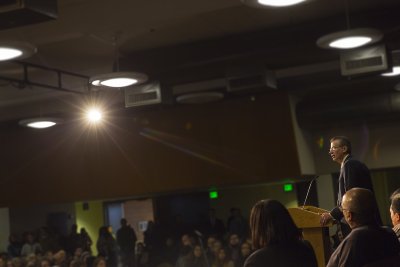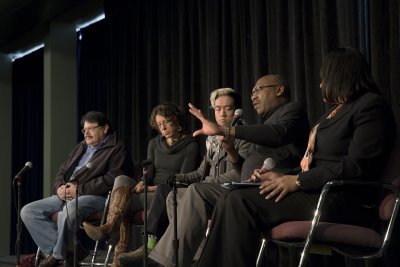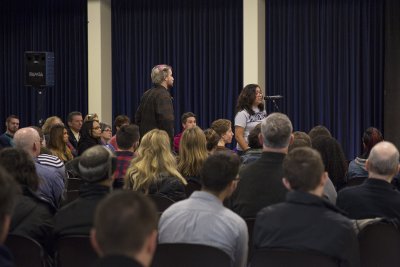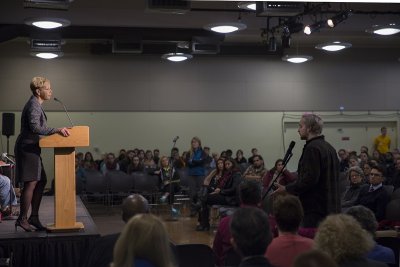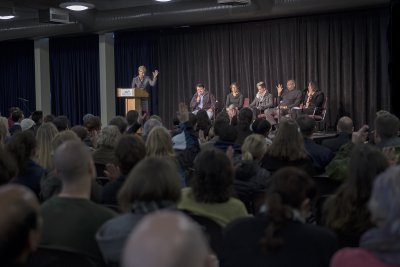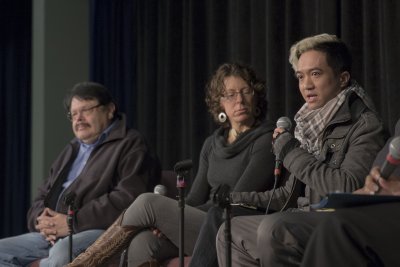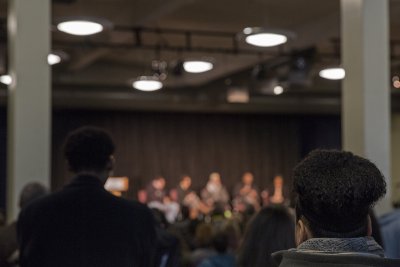Town Hall Meeting: ‘Racism attacks the body of a community’
Confronting and dismantling systemic racism requires work and reflection from all members of the campus community, not just those who are most harmed by it, said panelists at a Town Hall Meeting Monday morning to address the impact of recent hate messages directed at the Western community.
“This gathering today is not about us and them, or them and us,” said moderator Karen Dade, associate dean for Woodring College of Education. “It’s about us on this campus.”
About 350 people gathered in the Viking Union Multipurpose Room Monday morning for the frank discussion, which included four panelists and a few questions and comments from the audience. It was the first of several planned gatherings of emotionally honest conversations exploring ways to heal and bring about change. A link to a video recording of the meeting can be seen by clicking here.
Several student leaders have been targeted on social media recently with hateful, racist language and threats. WWU President Bruce Shepard’s Taskforce on Equity, Inclusion and Diversity called Monday’s meeting in part to use recent events as a springboard toward inclusion, safety and hope.
“Nooses and lynching,” said Shepard. “Who would have said such things? Our students of color know the answer and they have been telling us. It is not skin head white supremacists lurking on the fringe. It is the most ordinary members of the Western Community.”
“On behalf of Western I apologize to our students, faculty and staff of color,” Shepard said. “It should not have taken an incident such as this for all of us to recognize and empathically understand their experiences.”
Today’s “banality of racism” is just as harmful as the “KKK garb, burning crosses, Bull Connor and attacking police dogs” of his own college days, Shepard said.
“What we saw posted was merely a more public and, perhaps a bit more extreme display of what our students of color experience daily,” Shepard said. “There is nothing funny here; these are forms of violence. It is why people understandably walk our campus in fear.”
Panelist Larry Estrada, an associate professor in Fairhaven College of Interdisciplinary Studies, compared racism to cancer – both require vigilance and hard work to eradicate.
“Racism attacks the body of a community in many forms,” said Estrada, director of Western’s American Cultural Studies program. “There’s not a quick pill to stamp out racism. It’s a long, arduous process.”
It’s important, Estrada added, to understand the role of racism in the roots of higher education, which originally excluded women and people of color in order to serve only the elite.
Panelist Molly Ware, an associate professor of secondary education, cautioned people to avoid seeing the recent displays of racism as isolated incidents. “Really, it’s systemic,” she said. And it will take more people willing to be uncomfortable – to feel tension and discomfort as their own beliefs are questioned – in order for more lasting change to take place.
People need to be “emotionally honest, vulnerable and authentic” in order to analyze the structures of racism and for real reconciliation to take place, said panelist Shari Robinson, director of Western’s Counseling Center.
Another panelist, graduate student Alex Ng, agreed. “What we’re asking people to do is to choose to be uncomfortable,” said Ng, who is working toward a Master’s in Teaching. “It’s so important that we do that and that we have the courage to do that.”
Ng also noted that students of color have borne a disproportionate burden to educate their colleagues on campus about race. He urged white students and faculty to work harder to bring these issues to light. “We have to take on the burden ourselves and not wait for someone to do it for us,” he said.
Panelist Vernon Damani Johnson, professor of Political Science and director of the Munro Institute for Civic Education, said he and other faculty members had been in anguish for their students and felt that students’ voices had been missing from the campus conversation about racism. He read a statement from students who said the university had not done enough to ensure their safety; they also said more collaboration with student leaders of color was needed – and expected -- on messaging to campus regarding the recent threats. Input from students of color needs to be brought to the center of these and other discussions: “nothing about us without us.”
The students also expressed a hope that the conversation will shift toward more discussion on how to ensure safety for students, particularly students of color. Faculty need to be equipped, they wrote, to address racism in the classroom without leaving the task to beleaguered students of color.
There was time for a few comments and questions from the audience. Junior Lulu Sapigao, a board member of the Filipino American Student Association and a leader in a campus ministry, said she was upset that these issues hadn’t been addressed before now and called for more training for faculty on dealing with microaggressions in the classroom. Students of color, harmed by racism, are unfairly asked to educate those around them, she said. “It’s upsetting and it’s appalling.”
Another student asked how to respond when loved ones make sexist or racist comments. How does she move beyond anger and embarrassment and have a productive conversation that results in empathy, she asked.
Dade recommended simply speaking up, even at the risk of being unpopular. “It’s a matter of taking a stand and not being silent,” she said.
Dade said the Taskforce on Equity, Inclusion and Diversity had reviewed the timeline of Western’s response to the recent racial threats and had recommended the university establish a race threat assessment plan that would help campus officials to address these types of threats more quickly. The university is “getting right to work on that,” she said.
Plans are also in the works to continue the conversation in listening sessions in Western’s colleges. These affinity group sessions are meant to cultivate the courage to be emotionally honest, to set boundaries and to allow for vulnerabilities. The sessions are also places to connect with others within and across racial lines, explore ways to heal together and to actively champion systemic change that supports recovery and reconciliation.
Meanwhile, the Campus Equity and Inclusion Forum has nine workshops through Dec. 11. Members of the campus community are urged to attend one of these free workshops.
